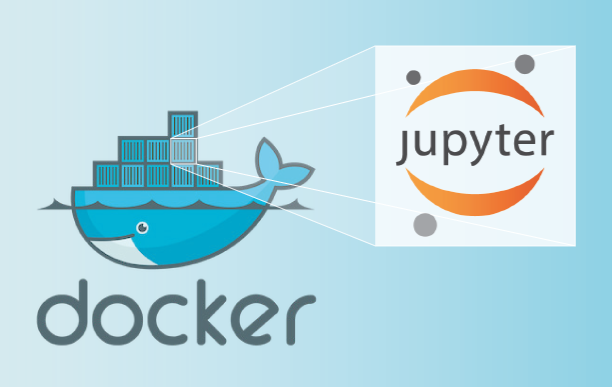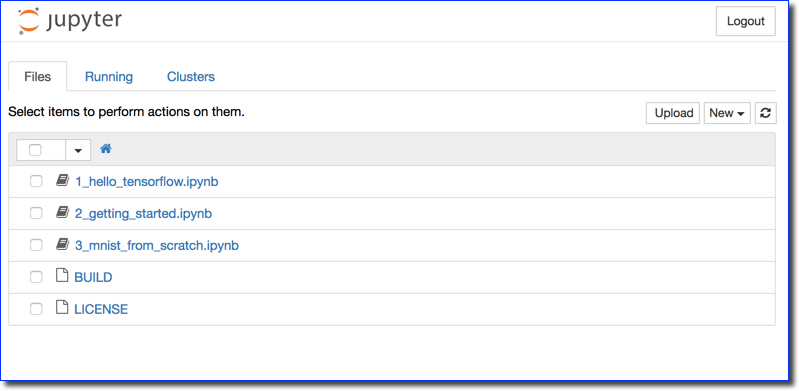Difference between revisions of "Tutorial: Using Tensorflow with Docker"
(→Start Jupiter) |
(→Start Jupiter) |
||
| Line 73: | Line 73: | ||
Jupiter is an application that runs in a browser and presents the user a virtual disk where the user can create folders and write programs. | Jupiter is an application that runs in a browser and presents the user a virtual disk where the user can create folders and write programs. | ||
| − | * To start the Jupiter connected to Docker, open your browser and enter the URL that was given to you in the previous step. If you get an error message, replace '''localhost''' by the IP given next to the whale logo, above (I got 192.168.99.100 when I started Docker). | + | * To start the Jupiter connected to Docker, open your browser and enter the URL that was given to you in the previous step. |
| + | |||
| + | http://localhost:8888/tree?token=someLongSeriesOfHexadecimalDigits | ||
| + | |||
| + | :If you get an error message, replace '''localhost''' by the IP given next to the whale logo, above (I got 192.168.99.100 when I started Docker). | ||
http://192.168.99.100:8888/tree?token=someLongSeriesOfHexadecimalDigits | http://192.168.99.100:8888/tree?token=someLongSeriesOfHexadecimalDigits | ||
Revision as of 10:57, 13 February 2017
--D. Thiebaut (talk) 22:42, 12 February 2017 (EST)
|
|
These are very quick instructions for installing Docker under Mac OSX and for running Tensorflow on it. This is a summarized version of the longer explanations given on the official TensorFlow Install page:
and the Docker Install page:
Install Docker
- Go there: https://docs.docker.com/docker-for-mac/
- Download
- Click on the package (do not worry about the warning)
Run Docker
- Find Docker in the Applications and run it
- It will open a Terminal window
- Note the IP that is specified at the end (should be http://192.168.99.100/)
## . ## ## ## == ## ## ## ## ## === /"""""""""""""""""\___/ === ~~~ {~~ ~~~~ ~~~ ~~~~ ~~~ ~ / ===- ~~~ \______ o __/ \ \ __/ \____\_______/ docker is configured to use the default machine with IP 192.168.99.100 For help getting started, check out the docs at https://docs.docker.com
docker is configured to use the default machine with IP 192.168.99.100 For help getting started, check out the docs at https://docs.docker.com
- Quick Docker by pressing Ctrl-C twice and return to the command line
Install TensorFlow "in" Docker
- Run the following command at the prompt, in the same Terminal session:
docker run -it -p 8888:8888 gcr.io/tensorflow/tensorflow
- This will download tensorflow and will take a few minutes (~ 8 minutes)
- Make a note of the URL that is given. It will be of the form:
http://localhost:8888/tree?token=someLongSeriesOfHexadecimalDigits
Start Jupiter
Jupiter is an application that runs in a browser and presents the user a virtual disk where the user can create folders and write programs.
- To start the Jupiter connected to Docker, open your browser and enter the URL that was given to you in the previous step.
http://localhost:8888/tree?token=someLongSeriesOfHexadecimalDigits
- If you get an error message, replace localhost by the IP given next to the whale logo, above (I got 192.168.99.100 when I started Docker).
http://192.168.99.100:8888/tree?token=someLongSeriesOfHexadecimalDigits
- You should end up with a window similar to this one:
- Double-click on the 1_hello_tensorflow.ipynb Jupiter notebook to open it.
- You may get an error when the notebook opens. Just click on Cell then Run All to get rid of the error.
- If the page appears without errors, then all the Tensorflow mini-programs will have run without errors, and you're all set!
Using Jupiter
- Here's a quick tutorial on using the Jupyter dashboard.

